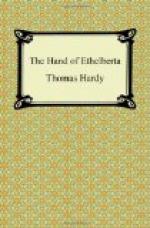The hour and a half wanting to half-past seven she passed with great effort. The main part of the time was occupied by dinner, during which she attempted to devise some scheme for leaving him without suspicion just before the appointed moment.
Happily, and as if by a Providence, there was no necessity for any such thing.
A little while before the half-hour, when she moved to rise from dinner, he also arose, tenderly begging her to excuse him for a few minutes, that he might go and write an important note to his lawyer, until that moment forgotten, though the postman was nearly due. She heard him retire along the corridor and shut himself into his study, his promised time of return being a quarter of an hour thence.
Five minutes after that memorable parting Ethelberta came from the little door by the bush of yew, well and thickly wrapped up from head to heels. She skimmed across the park and under the boughs like a shade, mounting then the stone steps for pedestrians which were fixed beside the park gates here as at all the lodges. Outside and below her she saw an oblong shape—it was a brougham, and it had been drawn forward close to the bottom of the steps that she might not have an inch further to go on foot than to this barrier. The whole precinct was thronged with trees; half their foliage being overhead, the other half under foot, for the gardeners had not yet begun to rake and collect the leaves; thus it was that her dress rustled as she descended the steps.
The carriage door was held open by the driver, and she entered instantly. He shut her in, and mounted to his seat. As they drove away she became conscious of another person inside.
‘O! Sol—it is done!’ she whispered, believing the man to be her brother. Her companion made no reply.
Ethelberta, familiar with Sol’s moods of troubled silence, did not press for an answer. It was, indeed, certain that Sol’s assistance would have been given under a sullen protest; even if unwilling to disappoint her, he might well have been taciturn and angry at her course.
They sat in silence, and in total darkness. The road ascended an incline, the horse’s tramp being still deadened by the carpet of leaves. Then the large trees on either hand became interspersed by a low brushwood of varied sorts, from which a large bird occasionally flew, in its fright at their presence beating its wings recklessly against the hard stems with force enough to cripple the delicate quills. It showed how deserted was the spot after nightfall.
‘Sol?’ said Ethelberta again. ‘Why not talk to me?’
She now noticed that her fellow-traveller kept his head and his whole person as snugly back in the corner, out of her way, as it was possible to do. She was not exactly frightened, but she could not understand the reason. The carriage gave a quick turn, and stopped.
‘Where are we now?’ she said. ’Shall we get to Anglebury by nine? What is the time, Sol?’




